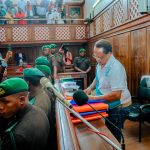
The head of the World Health Organisation, Tedros Ghebreyesus, on Tuesday issued an apology after independent investigators probing allegations of sexual abuse in the Democratic Republic of Congo (DRC) by the UN agency’s staff, issued a damning indictment citing what they called “clear structural failures” and “individual negligence”; investigators reported allegations of sexual abuse by staff deployed to fight an Ebola outbreak in the DRC.

“The first thing I want to say to the victims and survivors… I am sorry…” Tedros Adhanom Ghebreyesus told a news conference.
The 35-page report released by the investigators on Tuesday exposed the most wide scale sexual offenses linked to a United Nations institution in years, committed by personnel hired locally as well as members of international teams in the country from 2018 to 2020. The independent investigation commissioned by the World Health Organization (WHO) has identified more than 80 alleged cases of sexual abuse during the global health agency’s response to the Ebola outbreak in DR Congo, including allegations implicating 20 staff members.
“It is my top priority that the perpetrators are not excused but held (to) account…” Tedros Adhanom Ghebreyesus told said.
The investigations

The commission interviewed dozens of women who were offered work in exchange for sex, or who were victims of rape. The investigative report that resulted from the interviews described how an alleged victim, “Jolianne”, who is said to be the youngest of the victims, recounted that a WHO driver had stopped to offer her a ride home as she sold some products on a roadside in the town of Mangina in April 2019.
Instead, he took her to a hotel where she says she was raped by this person,” the report said.
The 35-page report notes “the scale of incidents of sexual exploitation and abuse in the response to the 10th Ebola outbreak, all of which contributed to the increased vulnerability of ‘alleged victims’ who were not provided with the necessary support and assistance required for such degrading experiences.”
The investigators were able to obtain the identity of over 80 alleged perpetrators, both Congolese nationals and foreigners. In 21 cases, the review team was able to establish with certainty that the alleged perpetrators were WHO employees during the Ebola response. The special commission in its report cited “individual negligence that may amount to professional misconduct”, which Tedros said “makes for harrowing reading”. Additionally, it said that alleged victims “were not provided with the necessary support and assistance required for such degrading experiences”. The WHO has continued to echo its heartfelt apology since the report on the violations was made public.
“As WHO leadership we apologise to these people, to the women and girls.” WHO’s Africa Director Matshidiso Moeti said at Tuesday at a news conference.
Structural failures

The investigative report also said it found “clear structural failures and unpreparedness to manage the risks of incidents of sexual exploitation and abuse” in DR of Congo. It decried belated training for staffers to prevent sexual abuse or exploitation, a refusal from managers to consider cases that were only provided verbally and not in writing, and other breakdowns and managerial shortcomings in handling the alleged misdeeds in nine separate cities or villages in the region. The investigators emphasized a “perception of impunity of the institution’s staff on the part of alleged victims.”
“We apologise to these people, to the women and the girls, for the suffering they have had because of the actions of our staff members and people that we have sent into their communities…” said Matshidiso Moeti, the WHO’s regional director for Africa.
The report further says that WHO leadership was aware of sexual abuse allegations a full six weeks earlier than it initially claimed. It quotes an email to the WHO’s ethics point man Andreas Mlitzke concerning such allegations in the eastern province of North Kivu, and that the “message was sufficiently explicit and was in fact the first report of incidents of sexual exploitation and abuse involving WHO staff during the response to the 10th Ebola outbreak.” The WHO “was aware of these incidents already in early May 2019 and not in mid-June 2019 as argued by Mlitzke” as indicated by the report.
Tedros appointed the panel’s co-chairs to investigate the claims last October after media reports said unnamed humanitarian officials sexually abused women during the Ebola outbreak that began in the DRC in 2018. At the time, the WHO chief pledged that any staffers connected to the abuse would be dismissed immediately.
With more than 2,200 recorded deaths, the 10th Ebola epidemic is considered the worst to hit the DR Congo since 1976, lasting from August 2018 to June 2020.






